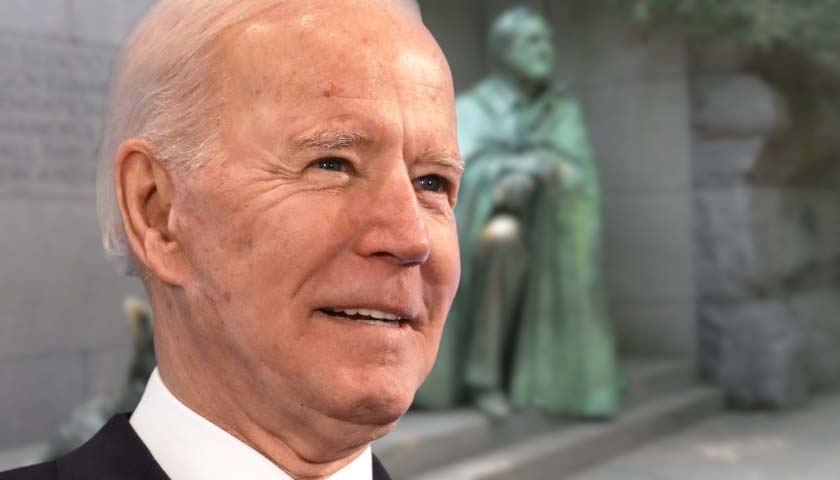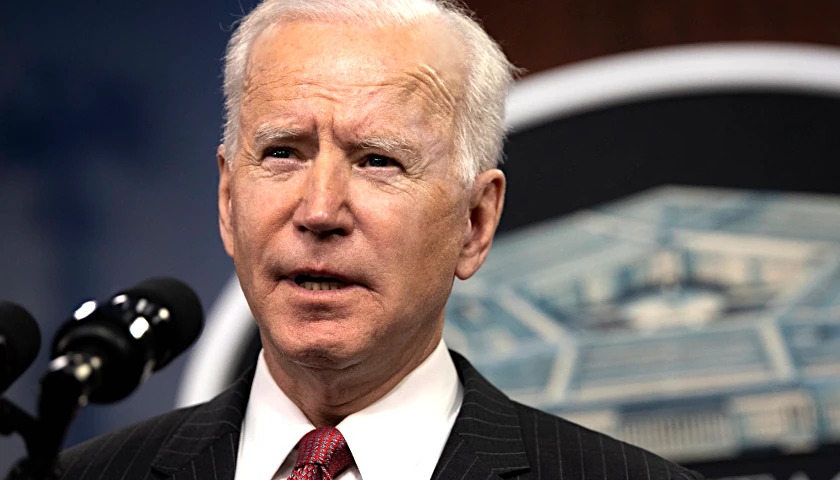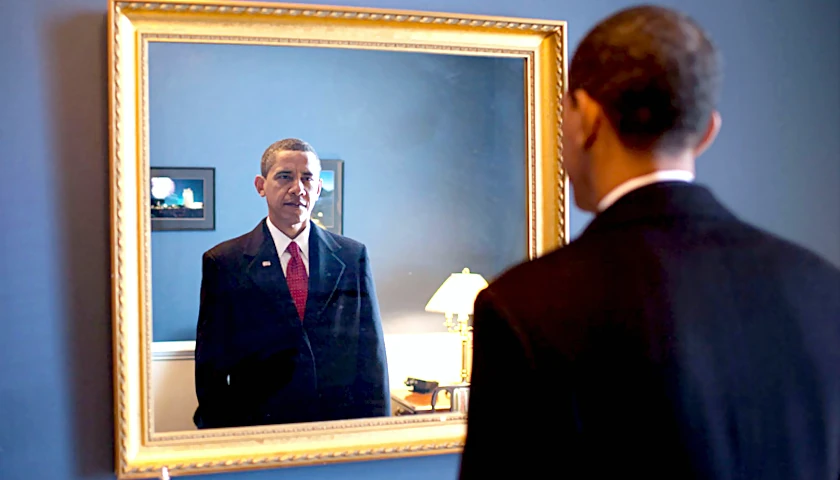by J. Michael Waller
The distant eyes and slack mouth, the befuddled shuffle off the walkway, recurrent unexplained schedule gaps and public disappearances, and off-the-wall comments finally make Joe Biden a pale copy of his hero, Franklin D. Roosevelt.
In wrapping up a war and realigning the world order, the first eight months of Biden as president resemble the last years of Roosevelt – except that FDR was on the cusp of victory against an avowed enemy.
The medical condition of an American president can affect the entire nation and the world for generations. Now, as then, one wonders who is really in charge of what.
FDR appeased Stalin on practically every major point leading up to the notorious Big Three Yalta summit with British Prime Minister Winston Churchill in 1945.
Biden has surpassed Roosevelt by simultaneously accommodating Vladimir Putin’s Russia, Communist China, state sponsors of terrorism like Qatar and Iran, and the global jihadist movement – in ways that will change the world for generations.
For the moment let’s not look at the actual policies, but at the conditions of the presidents themselves. Roosevelt at Yalta purposefully excluded wise visionaries like Loy Henderson and George Kennan in favor of others. As Afghanistan shows, Biden has not surrounded himself with the best and brightest.
Roosevelt had shown a certain softness toward Stalin since 1933, when he became president and recognized the Soviet Union. He rejected top diplomats’ advice that, among other things, a quid pro quo be attached to prevent the Kremlin from interfering in American internal affairs.
The president’s later extended illness would allow others to exploit that softness. In the last few years of World War II, FDR’s doctor put him on a four-hour-a-day work schedule with long vacations. Roosevelt had little time to devote to his duties as president. The issue wasn’t the paralysis that confined him to a wheelchair. It wasn’t mere overwork or loss of focus. Roosevelt’s cognition was degrading sharply. He delayed major decisions and ignored key responsibilities.
During a dinner with Churchill and Stalin at the November 1943 Tehran “Big Three” conference, Roosevelt collapsed. Stalin saw the American president’s condition firsthand.
New York Times reporter Turner Catledge recalled a March 1944 interview he had with Roosevelt. “He was sitting there with a vague, glassy-eyed expression and his mouth hanging open,” Catledge wrote years later in a 1971 memoir. “He would start talking about something, then in mid-sentence he would stop and his mouth would drop open. . . and he sat staring at me in silence.”
Democratic Party insiders knew of FDR’s feeble condition during the 1944 campaign for a fourth term. At the Chicago convention they carefully chose a reliable running mate, dumping incumbent pro-Stalin Vice President Henry Wallace in favor of the stable Harry Truman. Roosevelt did not attend. He dithered about Truman until almost the last day, and addressed the convention by radio.
After his acceptance speech, FDR took a therapeutic five-week ocean cruise to Hawaii to confer with General Douglas MacArthur and Admiral Chester Nimitz about the war in the Pacific. MacArthur noted, “I predict that he will be dead within a year.”
As many ailing people do, Roosevelt seemed to have good days and bad ones. As the war dragged into 1945, preparations began for a post-war world order. But FDR wasn’t there. “The president had made little preparation for the Yalta conference,” wrote future Secretary of State James Byrnes, then a Roosevelt confidant at the Big Three meeting, in his memoir Speaking Frankly: “I am sure [this] was due to the President’s illness.”
As chronicled by two seasoned writers whom I will credit in a future article, Churchill’s physician at Yalta, Lord Moran, observed that Roosevelt “sat looking straight ahead with his mouth open, as if he were not taking things in.” Sir Alexander Cadogan, a top British diplomat, noted, “Whenever [FDR] was called on to preside over any meeting, he failed to make any attempt to grip it or guide it, and sat generally speechless, or, if he made any intervention, it was generally completely irrelevant.”
Roosevelt had already lost his filters. At the Tehran Conference, Stalin’s toast to shoot 50,000 captured Germans outraged Churchill, but FDR countered with a jovial compromise to execute a mere 49,500. The president’s son, Elliott, explained it away as FDR’s humorous effort to make Stalin like and trust him.
At Yalta, Roosevelt got worse. When discussing the “Zionist problem,” Stalin asked FDR what concessions he might make to Ibn Saud, also known as King Abdulaziz Al Saud of Saudi Arabia. The official State Department account expunged FDR’s response from the record.
Other official records, including the minutes of the meeting archived at the Roosevelt Library in Hyde Park, New York, preserved what was said. Roosevelt told Stalin that “there was only one concession he thought he might offer and that was to give [Ibn Saud] the six million Jews in the United States.”
And then there were the actual policies.
FDR’s policies determined the fate of the entire world. At times Roosevelt didn’t understand the directives and strategies that he was signing. He admitted he had no recollection at the second Quebec Conference, in September 1944, of giving the OK to a summary of the Morgenthau Plan, a Soviet-backed postwar strategy to impoverish Germany forever by depriving it of its industry and transforming it into a permanently poor agrarian country.
After being handed a policy for the Western Hemisphere, presidential interpreter Charles Bohlen said, “Roosevelt signed the document without understanding its contents.”
FDR’s medical records show the president in the later war years was “gripped by clinical depression.”
The entire American policy at the height of World War II was in the hands of often anonymous presidential aides and bureaucrats. Churchill sent cables to the White House urging aid to anti-Nazi (and anti-Soviet) resistance fighters in Poland. They went unanswered.
“I was no longer being heard by him,” Churchill would recall.
The Roosevelt-Stalin new world order ratified at Yalta, much of it over Churchill’s strongest objections and widely seen as a sellout to the Kremlin, would determine the aftermath of 1945: an institutionalized Soviet empire, the Cold War, the nuclear arms race, Communist China, Soviet-inspired Marxist penetration of Western educational and cultural institutions, the rise of globalist organizations and elites, and so much more.
It was at Yalta that FDR dubbed Stalin “Uncle Joe.”
Today’s Uncle Joe sits in the White House. Like his hero, Joe Biden is severely diminished and declining. Biden was never the grand strategist or foreign policy genius he pretended to be as a senator and later as Barack Obama’s running mate and vice president. Now, Biden’s worst instincts have metastasized as his appointees run the show.
Biden’s entire political history is one of weird gaffes. But in unscripted remarks as president, Biden fairly has admitted his staff is running him. Aides have urged him not to take questions from reporters. The president has conceded that he is “going to get in trouble with my staff.”
But, as with Roosevelt, terrible policies are different from bizarre comments.
Biden is a ghost helming the ship of state. His vice president, Kamala Harris, isn’t up to the task.
Policies are being made now, as they were under FDR at Yalta, that will determine the future of our country for generations to come.
It’s time to look at who precisely is running the ship, why they are doing what they are doing, and for whom.
– – –
J. Michael Waller is senior analyst for strategy at the Center for Security Policy. He holds a Ph.D. in international security affairs at Boston University and for 13 years was the Annenberg Professor of International Communication at the Institute of World Politics.
Photo “Joe Biden” by Gage Skidmore. CC BY-SA 2.0. Background Photo “Washington D.C.: Statue of Franklin Delano Roosevelt with Fala, His Scottish Terrier” by Reinhard Link. CC BY-NC-SA 2.0.






Roosevelt was very popular in the Southeastern U.S. with both common whites and blacks. The only group of Southeasterners to oppose Roosevelt were the small group of white oligarchs that controled many southeastern states as their own feifdoms, denying even common whites, as well as blacks, a meaningful say-so in their state governments.
obama, via susan ross, is really in control.
joe is just a puppet.